Peter MALONE
Saturday, 18 September 2021 19:23
That Cold Day in the Park
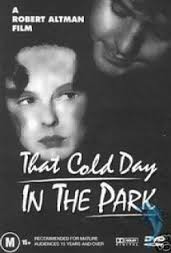
THAT COLD DAY IN THE PARK
Canada, 1969, 115 minutes, Colour.
Sandy Dennis, Michael Burns, Susanne Benton, Luana Anders, John Garfield Jnr.
Directed by Robert Altman.
That Cold Day in the Park is quite an unusual film and was not particularly successful at the box office. It is a rather grim story about a repressed spinster who takes in a young man to help him and whose interior passions are unleashed in a melodramatic and violent way. Sandy Dennis, using her familiar mannerisms, was the star and sustained the film on its release. However, in retrospect the film was probably more interesting as being one of the earliest films directed by Robert Altman. In fact his film after this one was M*A*S*H. Since then Altman has not looked back and has made such a variety of films as Brewster McCloud?, McCabe? and Mrs. Miller, Images, Thieves Like Us, Nashville, Buffalo Bill and the Indians, Three Women. Nashville won him an Oscar nomination. In this particular film, there is the observation of the Canadian way of life in Vancouver, some satire in the presentation of the characters, an exploration of madness which was to recur in such films as Images and Three Women. However That Cold Day in the Park is still interesting as a step in the career of a prominent director.
1. The meaning and tone of the title? Its fulfilment and irony? Audience response to the title and its tone?
2. How successful was this film as entertainment? Was it sick entertainment? Was it an intelligent probing of human problems? Satisfying on that level?
3. What values did the film stand for? Was it a good psychological exploration of a sick person? Situating her in her society? Or was it merely a surface and sensational presentation of events?
4. How important was the Vancouver atmosphere? The city itself, the weather, cold days and rain, the ethics of the society of Vancouver? Frances' family and associates, the boy's background? middle-class morality and values and the seething underneath?
5. How well did the film create the atmosphere of Frances' flat? The role of the housekeeper, Frances as a spinster, her memory of her parents, her relations and fiance, the style of living?
6. How well did the film explore Frances as a person? Her work, her life, audience sympathy with her, being sorry for her, her fascination with the boy and the way that this was filmed from the window with the rain? The audience sharing her fascination and curiosity2 The way that she encountered the boy and invited him in?
7. How did the boy change Frances' life? What happened to her? Her mothering him, protecting him, the nurturing with meals and the bath, her response to his not talking, her monologues and the importance of this for expressing herself, her loneliness, her responding to herself, her disappointment in him, the growing possessiveness etc.? How important were the monologues in revealing Frances' character? Especially the monologue to the doll in the bed?
8. How was the change in her manifested in the film? Her growing cruelty, the aspects of sexuality and lust, boarding up the windows, her going to be fitted for a diaphragm, sharing the drugged queers with him, the highlights of the loneliness, murder and revenge?
9. The character of the boy? Was he credible? Was he symbolic? Being in the rain, his background of playing games and keeping silent, the mystery about him, his knowledge and awareness of himself, his puzzle over Frances and yet accepting her hospitality, the balance of his going to his sister, her visiting him? What happened to the boy in his encounter with Frances? His being possessed? His lack of response to her? His fear at the end and wanting to escape? Imprisoned by her?
10. The character of the prostitute - her puzzlement over Frances, her relationship with the boy, the murder and the psychotic reaction of Frances?
11. How important to balance the film was the boy's visit to his home, the scenes where he talked, his relationship with his sister and her boyfriend? The background of his family, the boat? His sister's visit to the house and the suggestion of incest. Was this necessary and appropriate for this film?
12. What did the film have to say about people's lives changing, fear, terror?
13. The encounter between Frances and her fiance? As an important part of the film for clarifying motivation and what was happening?
14. The change. of atmosphere when Frances went looking for the prostitute? Being suspected of being lesbian? The tone that the film took at this stage? The preparation of the final madness?
15. How did the film portray madness, violence? The comment that it made on madness and violence, sexuality and the needs of modern society?
16. The quality of the dialogue? How realistic, how symbolic? The quality of Frances' monologues? The boy's silence?
17. Comment on the technical side of the film: the zooms, the dissolves, the conscious using of different styles of editing and scene-changing? Did this add to the film or take away from it?
Published in Movie Reviews
Published in
Movie Reviews
Tagged under
Saturday, 18 September 2021 19:23
Thank Your Lucky Stars
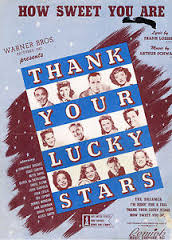
THANK YOUR LUCKY STARS
US, 1943, 127 minutes, Black and white.
Eddie Cantor, Dennis Morgan, Joan Leslie, Edward Everett Horton, S. Z. Sakall, Humphrey Bogart, Jack Carson, Bette Davis, Olivia de Havilland, Errol Flynn, John Garfield, Alan Hale, Ida Lupino, Ann Sheridan, Dinah Shore, George Tobias, Spike Jones and his City Slickers, Willie Best, Hattie Mc Daniel.
Directed by David Butler.
Thank Your Lucky Stars is an entertaining Warner Bros. musical of the early '40s - part of the war effort. other studios made similar films like Paramount's Star Spangled Rhythm and Thousands Cheer.
The thin plot focuses on Dennis Morgan, Joan Leslie and Eddie Cantor as the tour bus driver. Dennis Morgan has ambitions to be on the Eddie Cantor Show - and has an opportunity to sing several songs. Joan Leslie is a songwriter - who also attractively sings and dances. However, the film is Eddie Cantor's - in two roles: as himself, egotistical, controlling things and interfering, doing his entertaining song and dance routines; bespectacled as the bus driver, the reverse of his ego role. He carries both off particularly well.
A show has to be put on and the producers are Edward Everett Horton and S. Z. Sakall - indulging in their familiar screen personas, very entertainingly. (Director David Butler – veteran of many Warner Bros. musicals -and producer Mark Hellinger also make appearances.)
However, the important thing is the number of star turns with the Warner Bros stars, Dinah Shore, in one of her earliest films, has several numbers. John Garfield sends up his own tough image and sings a version of 'Blues in the Night'. Humphrey Bogart appears as an unshaven tough guy only to be talked down and hurriedly leaving the theatre frightened of what the fans of his tough guy image. Jack Carson and Alan Hale have a humorous song about going north. Ann Sheridan sings a sultry song, 'Love Isn't Born, It's Made'. However, some of the surprise elements are George Tobias singing a jitterbug number with Olivia de Havilland and Ida Lupino; Errol Flynn sings, very well, a Cockney action song; Alexis Smith dances quite expertly; and Bette Davis has the star turn with the Oscar-nominated 'They're Either Too Young Or Too Old'.
The film is a good example of Warner Bros. '40s entertainment - and is still quite pleasing.
Published in Movie Reviews
Published in
Movie Reviews
Tagged under
Saturday, 18 September 2021 19:23
Texas Lady

TEXAS LADY
US, 1955, 85 minutes, Colour.
Claudette Colbert, Barry Sullivan, Grey Walcott, James Bell, Horace Mc Mahon, Ray Collins, Walter Sande, Douglas Fowley.
Directed by Tim Whelan.
Texas Lady is a pleasant, "old fashioned" western comedy drama. It was one of Claudette Colbert's last films and she is paired pleasingly with Barry Sullivan. The film is one of many R.K.O. minor westerns of the time,
1. An enjoyable low-key western?
2. Superscope, colour photography. the atmosphere of New Orleans and Texas? Colour photography and locations? Musical score and the title song?
3. Expectations of the western: the gambling background of New Orleans and the pioneering in Texas? The newspaper? The domination of the town by ranchers? Money deals? Hired gunmen? The life of the town and the eruption of violence? Elections? The blockade of the town? The Texas Rangers and the happy ending? Audience enjoyment and acceptance of these conventions?
4. The basic ingredients of the plot: gambling, romance, enterprise, the threat of violence? The American heritage?
5. Claudette Colbert's style as Prudence? The intensity of the opening poker game? The move to Texas? Her setting up the paper? The clashes with Chris? Jess Foley and his tough stances? The encounters with Ralston and Sturdy? Their wanting to get the paper? Foley's death? Chris Mooney and her initial antagonism because of her father? Having defeated him in New Orleans, unwilling to join with him in Texas? The reuniting with Chris? His helping her? The conquering American heroine?
6. Chris as the gambler, success on the riverboats, the defeat by Prudence? His arrival in Texas, the clashes with Ralston and Sturdy, shooting the gun from Foley etc.? The persuading of the townspeople to react? The ranchers' men surrounding the town? The end of the siege? The election? Chris working with Prudence?
7. The sketch of the villains: Ralston and Sturdy as the arrogant ranchers, their pressure on the paper, on Prudence? Foley as the hired gunman? The irony of his death by the widow?
8. The sketch of the town? The contrast with the easy way of New Orleans? The pioneering of the Texas forts? The use of newspapers, moral persuasion, elections, violence? Authority and the Texas Rangers?
9. A satisfying blend of action and romance? American know-how and success - for the middle-aged and older audiences?
Published in Movie Reviews
Published in
Movie Reviews
Tagged under
Saturday, 18 September 2021 19:23
Texas Chainsaw Massacre, The
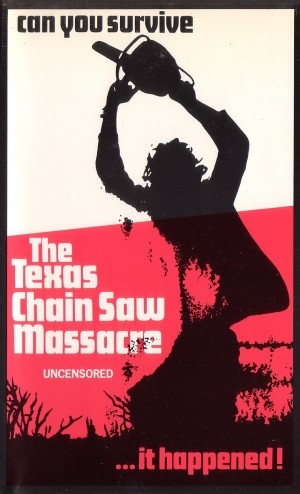
THE TEXAS CHAINSAW MASSACRE
US, 1974, 79 minutes, Colour.
Marilyn Burns, Allen Danziger.
Directed by Tope Hooper.
The Texas Chainsaw Massacre has become something of a cult macabre horror film. Made in the mid-'70s and based on an alleged true story, it was an example of small-budget local Texas film-making. With its focus on multiple murders and a band of young people being terrified, it heralded a new genre which was exploited in the late '70s and early 180s. The most significant examples of the genre were John Carpenter's Halloween and Sean S. Cunningham's Friday the 13th. While there were many derivatives and imitations, the tendency was to more and more explicit violence and an exploitation of situations and visual presentation of blood and gore.
The film was produced, co-written and directed by Tobe Hooper. He also contributed to the musical score. He made an impact with this film and was invited to Hollywood where he made another stylish horror film, The Funhouse, and directed the two-part telemovie of Stephen King's Salem’s Lot. Stephen Spielberg produced Poltergeist in 1981 and invited Hooper to direct it.
While the film is macabre and often exploitive, it has some credibility about it. There is a names-and-dates prologue, there is presented a situation about body-stealing in Texas and the emphasis on the youngsters visiting the cemetery and looking at their old home is plausible enough. The film delineates the characters of the youngsters well enough for the genre, introduces the madman early and indicates his propensity for violence and its effect on the youngsters - and then is able to create Gothic madness and violence in the middle of outback Texas.
While the characters are in many ways stereotyped, they are presented with sufficient character style and interest to engage audience sympathy for them and their plight. The first deaths are presented more moderately - there is an escalating violence and visual horror? This is combined with mad characters, three brothers who illustrate violent mania: the garage attendant who seems sane but whose smile becomes more manic, the expected madman with the glint in his eye who cuts himself for the mere pleasure of it etc., and then the masked butcher. Touches of cannibalism are presented with an odd and visually repulsive grandfather who lives upstairs in the attic. The final focus of the film on the character of Sally and her continued screaming and fear becomes almost too much.
The special effects are very clever, tending at times to the sensational and exploitive.
The film is an example of American Gothic - a style followed in a number of films about madness and, even, the occult in remote communities e.g. Halloween and Deadly Blessing. (Deadly Blessing was directed by Wes Craven whose horror films resemble The Texas Chainsaw Massacre in tone: The House on the Left, The Hills Have Eyes, and even his comic strip adventure Swamp Thing).
The Texas Chainsaw Massacre was banned for many years in several countries, including Australia. On its release it seemed, despite its violence, less gruesome and sensationalistic than many other similar films of the late '70s and early '80s.
Published in Movie Reviews
Published in
Movie Reviews
Tagged under
Saturday, 18 September 2021 19:23
Test Pilot
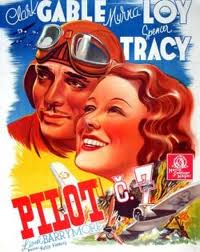
TEST PILOT
US, 1938, 118 minutes, Black and white.
Clark Gable, Myrna Loy, Spencer Tracy, Lionel Barrymore, Samuel S. Hinds, Marjorie Main, Gloria Holden.
Directed by Victor Fleming.
Test Pilot is one of many movies about aviation in the '30s. Howard Hawks made several: Hell's Angels, Ceiling Zero, Only Angels Have Wings. The novelty of the development of planes and their use in warfare and in civil aviation was important at the time. This is a Clark Gable vehicle - he was teamed once again with Myrna Loy. Spencer Tracy is very good as the (somewhat artificial-seeming now) best friend. He did the same kind of role later in Boom Town (1941). Gable and Tracy both worked in many films with Victor Fleming e.g. Gable in Red Dust and Tracy in Tortilla Flat, Captains Courageous and Dr. Jekyll and Mr. Hyde. The film seems dated now but shows the popular teaming for star vehicles of the '30s.
1. A popular film of its time, interest in aviation, romance and personal drama? Impact in the '30s, now? On the eve of World War Two?
2. M.G.M. black and white photography, production values, gloss, special effects, the star teaming?
3. The introduction about aviation, safety and regulations? The development of planes, interest of the Air Force prior to World War Two? The pioneers, the daredevils? In love with the sky? Races, prizes?
4. Clark Gable as Jim - strong hero, champion, ladies' man, in love with the sky, enjoying danger? Gunner as his best friend? Understanding him, supporting him? The chance crash landing and the encounter with Ann? The enjoyable day? His change, coming back for her, the impulsive marriage? The interaction with Drake - his being fired, flying another plane? The death of Benson? His marriage to Ann, the visit with the landlady, the buying of the nightgown? Comic touches? His charity towards Benson's wife? The five-day celebration, Ann finding him? Her reconciliation and yet his lack of awareness? The importance of the range of tests, bailing out? The balance with the happy times with Ann and Gunner - at the carnival? Ann's courage? The importance of the flight to 30,000 feet, Gunner's death? His being with Gunner? Ann’s reaction, clash, Drake's help, change - and his work in training men?
5. Gunner - Spencer Tracy, the friend, work and skill, wisecracks, exasperation, money help? His ever-presence with the group - and his image of the three roads? Drinking, clashes? Support of Ann? The 30,000 feet test, his death and the bond with Jim?
6. Ann - the Kansas girl, her dreams , finding Jim, the outing and her fiance, exhilaration, eloping, marriage? The talk with the landlady, the shopping? Her love for Jim - the competition, anxiety? The five days and her fears? Knowledge about Mrs. Benson? Her decision to support him - the tension, her collapse? The happy ending?
7. Drake and the business managers, clashes with Jim, support of the Army, tests?
8. Benson and his flying, family, hopes, death - and not being good enough?
9. The tough man's world of the 1930s? Aviation as a man's testing ground?
10. A portrait of types - masculine-feminine relationships, work, comradeship, friendship and spirit? The warmth in human relationships, the need for success, challenge, career? Priorities? A pleasing - and somewhat idealised ~ picture of Americans in the '30s?
Published in Movie Reviews
Published in
Movie Reviews
Tagged under
Saturday, 18 September 2021 19:23
Tess
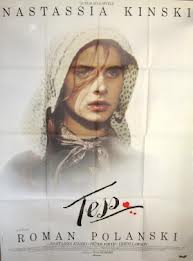
TESS
France/UK, 1980, 179 minutes, Colour.
Nastassia Kinski, Peter Firth, Leigh Lawson.
Directed by Roman Polanski.
Tess is Roman Polanski's version of Thomas Hardy's novel 'Tess of the d'Urbervilles'. Hardy wrote of a distinctive countryside: the farms, towns, coast of Wessex and its farming people, new or decaying aristocracy. He wrote of passion, fate and the gods of Stonehenge. Roman Polanski, after a varied career as a film-maker with such films as Repulsion, Rosemary's Baby, Macbeth, Chinatown, The Tenant, has made an elegant old-fashioned, very beautiful film (Oscars for decor, costumes, photography) that interprets Hardy and may or may not satisfy. The heroine is all and she is played by the daughter of Klaus Kinski, Nastassia Kinski. She is played more with passive romantic melancholy than with fire. The men are more stereotyped: Leigh Lawson's handsome cad and Peter Firth's earnest but harsh husband. There is an interesting supporting cast.
The beautiful photography by Geoffrey Unsworth and Ghislain Cloquet is breathtaking - and Normandy was used instead of England. The defects of encapsulating a novel in three screen hours appears more after than while the film is in progress. Comparisons may be made with John Schlesinger's version of Far From The Madding Crowd, 1967, with Julie Christie, Alan Bates, Peter Finch and Terence Stamp. Alan Bates also starred in a celebrated television series of The Mayor of Casterbridge.
1. The work of Roman Polanski? His appreciation of the English novel? European background? His film work - with characterisation and the emphasis on horror? His adaptation of Shakespeare? His reverence for Hardy, his using the novel, characters, spirit over a period of almost three hours? A satisfying version of Hardy? The film's dedication to Sharon Tate?
2. The work of Thomas Hardy - his view of England in the 19th. century, his particular world of Wessex, his place in the tradition of English novel writing? The background of the west country, class distinctions, work, the land? The interaction of men and women in this countryside? Love and passion? Violence? Suffering? Fate, chance, tragedy? The blend of melancholy and romance? Tess of the d'Urbevilles as a typical Hardy novel?
3. The quality of the colour Panavision photography? Oscar-winning? The of Normandy for Wessex? Oscar-winning decor and costumes? The Wessex village, the poor homes, work in the fields, leisure of the country people with dancing, taverns? Signs of industrial progress? The contrast with the wealthy homes? The parsonage? Polanski's eye for visual compositions, movement? The editing and the pace to suggest the pace of the 19th. century? The dramatic and romantic musical score?
4. The impact of Nastassia Kinski as Tess? Age, beauty, presence? Her passive style suggestive of depth? Romantic melancholy? Her awareness yet her being victim? Her potential for being a heroine and a success in life? Victims of her family, of Alec, Angel? Her giving up for the sake of others? The pathos and tragedy of the murder and her death?
5. The atmosphere of the opening: the long tracking shot of the road, the dancers arriving and the merriment and glee, the parson and his encounter of John Durbeyfield and the discussion about aristocracy? Tess amongst the dancers, Angel and his brothers joining in the dance? The opening sequence with the germ of all the ironies that were to develop later? An ordinary afternoon in a village with the potential for extraordinary interaction?
6. The portrait of the Derbeyfields - their poverty, the large family, the squalor of the house? The father's preoccupation with his ancestry, the spoon and his tales at the inn? His willingness to sell the title cheaply? The mother and her difficulty in bringing up the children, reliance on Tess and work? The father and his alcohol?
7. The initial portrait of Tess at home, her lack of interest in the title, her seeing it as pretentious? Her unwillingness to go to the cousins and to be in service? The interview with Alec and the symbolism of eating the strawberries? The encounter wit-h his mother and her blindness and love for the fowls? Her work in the household? The newly rich family and their buying the title? Enjoying the privilege of the title? Her initial relating to Alec, resisting his charm, the outings, passion and his almost raping her? The subsequent lyrical sequences with the two? Her decision to leave? Alec's pursuing her and getting her to promise to ask him for help? The effect of this experience on Tess?
8. Her return how, work in the fields, revelation that she had had the child? Its illness and her baptising it? The father not allowing the parson into the house? Tess' request for the Christian burial of the child and the parson's standing by the letter of the law? Her bitterness against him and her loss of faith in God and religion?
9. Her leaving how, searching for work, arrival at the dairy and immediately going to work, relating to the master, the girls in the dairy? Angel Clair and his presence learning farming methods? The discussions at the table - especially about the soul going out of the body? The suggestion
of Tess' wisdom and depths of feeling?
10. Angel Clair and his idealism, his capacity for work, his earnestness? His place in the household, the girls infatuation with him? Watching him out the window? Tess and her seeming not to notice him? Angel's visit to his family, the overtones of the strict parsonage, not drinking etc.? Meeting the girl he was expected to marry and her work with the Sunday school? The discussion with his parents about marrying and migrating?
11. Tess and her growing love for Angel? The importance of the sequence where he carried the girls over the water? Tess' resisting marrying him? Her love, wanting to be honest? His persuading her to tell the truth? The importance of her writing the letter, the happiness of meeting him on the following morning and the irony of his not having read the note, her destroying it? Her decision to marry and the lyrical scene of the two carts and horses going to the church? The basis for the marriage?
12. The atmosphere of joy for the honeymoon, arriving at the house and the fussing of the housekeeper? The meal and Angel's confession? His feeling better after the confession? His inability to hear Tess? His shock about her purity? His hurting her, going for a walk? Her despair? The breakfast the following morning and his decisions? The servants arriving and seeing him leave? His taking Tess away and abandoning her? His judgment about letters? Tess' writing to him and pleading with him, his ignoring the letters? Leaving it till too late?
13. Tess and her grief, her returning home (and the irony of her mother's advice not to tell Angel the truth)? Her being picked up by the brutal overseer? Her meting Marion again and staying with her? Marion's drinking and kindness? The hard work in the vegetable fields? The oppressive overseer? Alec and his tracking Tess down, staying all the day and refusing to move? How genuine his concern?
14. The death of Tess' father, the family moving and searching for lodgings in the town? The mother's pride in the family title and going to the church where the ancestors were buried? Poverty? Angel and his return home? His visit to his family - and the irony of Tess' visit to the village, seeing Mercy Chant and leaving her boots and Mercy taking them? Angel's parents? Angel's collapse, his failure in Brazil, illness? His search for Tess and going to her how, finding her mother, her mother indicating where to look? Audience sympathy for Angel yet conscious of his failures towards Tess?
15. Angel finding Tess and the ironies of her being with Alec and supporting her family? The landlady and her snooping? Tess urging Angel to leave and his reluctant departure? Alec and his taunts of Tess? Her stabbing him - and the suggestion of blood drops on the roof and the landlady's reaction?
16. The film's gathering momentum with Tess' escape, the railway station, encountering Angel, telling the truth? Angel's decision to help her? Their idyllic night in the empty house? The continued flight? The arrival at Stonehenge? The symbolism of Tess sleeping with the pagan ritual suggestions of sacrifice at Stonehenge at dawn?
17. The police arriving, Angel's protecting her, her finally going with the police - and the plain caption at the end? The tragedy of Tess?
18. The range of characters portrayed from Hardy's world - in the village, in the inn, in the Derbeyfields' home, the Stoke d'Urbervilles, the Clairs.. the girls in the dairy - Marion and her boisterousness, drinking, care for Tess; Izz and her infatuation with Angel and her visiting him and his offering her to go to Brazil,, her declaration that nobody loved him more than Tess? Workers in the fields,. the landlady at Sandbourne?
19. The 19th. century world. England? A real world - yet heightened for Hardy's exploration of love. passion. tragedy?
20. How satisfying the treatment of Hardy themes: fate, cruelty, choice and accidents, class and pretensions, the collapse of the old nobility, old wealth and new, hard work, passion, betrayal, death? The modern and the conservative? Morality, judgment, conscience, retribution?
Published in Movie Reviews
Published in
Movie Reviews
Tagged under
Saturday, 18 September 2021 19:23
Territorians, The
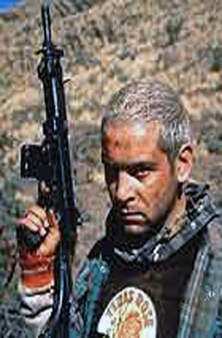
THE TERRITORIANS
Australia, 1996, 90 minutes, Colour.
Steven Vidler, Aaron Pederson, Susan Lyons, Jamie Croft, Peter Adams, Robert Mammone.
Directed by Michael Offer.
The Territorians was created by Robert Bruning, a veteran actor and veteran producer of television movies, some of which became television series. This has the hallmarks of a television series. It was written by Ted Roberts, writer of such films as The Settlement.
While the setting is the Northern Territory and there are some scenes of Darwin, the film was made in Adelaide and the Flinders Ranges, standing in for the Territory. The scenery is quite spectacular, giving a fine impression of the range of terrains to be found in Central Australia.
The plot is fairly conventional, the Sydney detective who was considered a dobber, moving to work in the Northern Territory and moving his somewhat reluctant wife and son, hoping for a new life. However, he is continually busy and his called to investigate brutal murders out in the desert. His wife and son, who were going camping with him, drive down to the town at the centre of the investigation. There is a genial sergeant who is about to undergo bypass surgery, and an Aboriginal detective. These two are played by Peter Adams and Aaron Pederson. Susan Lyons is the wife, Jamie Croft (That Eye the Sky) is the son and Steven Vidler is the detective. The film makes a point about expertise in the city and expertise in the desert, some of the arrogant attitudes of white people to black detective as well as to underlings. Needless to say, all the issues are raised and discussed, culminating in the sergeant, wife and son being caught up with the escaping murderer. The murderer is played by Robert Mammone. Direction is by Michael Offer, director of many telemovies and television series.
1. An entertaining murder thriller? Detective action? The Northern Territory setting?
2. The title, expectations? The attitude of the Territorians to their city and towns, landscapes and deserts? The Aboriginal tradition, the glimpses of the Aborigines, their relationship with the white people, the sergeant? Tom and his role as an Aboriginal policeman? A true Territorian? The finale with McCabe? and his family becoming Territorians?
3. The scenes of Darwin, the desert, the ranges? The Flinders Ranges photography? The importance of the landscapes? The effect of the desert, isolation, heat, rugged terrain?
4. The opening with the helicopter pilot and the cattle, going through the camp, discovering the dead bodies? The discovery of the girl buried under the rocks? The murder of the old woman at the service station? The murder of the lonely wife? The sexual assault after death? The brutality of the killings? The murderer as a psychopath, in an institution, his escape, stalking the nurse and murdering her, photographing his victims and himself? Molly and her telling him that she would recognise him? Her death? The lonely wife, up from the south, the grief of her husband after her death? Her fears, not wanting to be hurt?
5. The portrait of the murderer, the sketch of the man who had been institutionalised, out, a menace to society (and the echoing of cases in the Northern Territory)? His cruelty, silence, sexual assault? The motorbike? His finally confronting the sergeant, Anne and Josh? Up on the rocks, the sergeant throwing the spear, his death?
6. Mc Cabe, his explanation of his past in Sydney, dobbing in, having to move, at the meeting, the flight, his arrogant manner, his taking charge, attitudes towards Tom and the sarge? The quality of the investigation? On the bike, in the car, the helicopter? Following clues, forensic information, the photos? Going to the murder sites? The confrontation with Tom, the frank speaking to each other? His relationship with his wife and son, unable to go camping, his not feeling guilty but sorry? Meeting them at the town? The build-up to the final confrontation, getting out of the helicopter, on the hill, the shooting? The future and their remaining in the Territory?
7. Anne, her moving to the Territory, new beginnings, out with the sergeant? Stranded, getting desperate? Josh, his expectations, admiration of his father, going camping with the sarge, enjoying it? His wanting to stay in the Territory?
8. Tom, the Aboriginal detective, his standing in the community, Aboriginal background, his abilities, McCabe's attitude towards him and his tracking abilities? The confrontation? His getting the clues, the investigation, consoling the husband? The final confrontation with the killer?
9. The sarge, age, experience, heart trouble? The clashes with McCabe? Taking Josh and Anne camping, the enjoyment? The heart attack, having to stay the night? His being shot, hurling the spear and killing the killer?
10. The supporting characters, the officials in the Northern Territory, Sal and her communications, the various police and the investigation team?
11. The potential for a television series? The quality of the characterisations? Detection? Social issues?
Published in Movie Reviews
Published in
Movie Reviews
Tagged under
Saturday, 18 September 2021 19:23
Terror Train
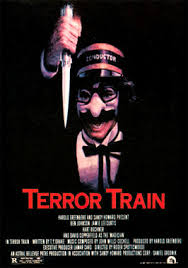
TERROR TRAIN
Canada, 1979, 97 minutes, Colour.
Ben Johnson, Jamie Lee Curtis, Hart Bochner, David Copperfield, Derek Mac Kinnon.
Directed by Roger Spottiswoode.
Terror Train is the fourth time round for Jamie Lee Curtis ('Time' said "Queen of the screamies") to be terrorised by homicidal maniacs (Halloween, The Fog, Prom Night). She portrays the strong, intelligent young woman audiences can admire, identify with and get some plausibility for the horror. The plot is always the same: the perpetrators of malicious acts are terrorised by the traumatised victim. This one is as good as any other: Ben Johnson is the benign railway guard and magician David Copperfield entertains with his tricks. The novelty aspect is a graduation party aboard a train and trapped by terror; some are nasty, some nice and all in danger. Jamie Lee Curtis' next film was the Australian-made Road Games directed by Richard Franklin. Director Roger Spottiswoode was a former editor.
1. The appeal of this kind of horror film: fear, scares, shocks? Identification with the victims? Testing one's ability to cope imaginatively, vicariously? The values of nightmares and coping? The pleasure of being scared?
2. The homicidal maniac genre and the quality of this film as an example? Its popularity at all times. during the late 1970s? Jamie Lee Curtis and her presence in so many - echoes of her mother in Psycho?
3. The plausibility of the plot? The point about victims and the way that they are treated, the callous victimisation? The poetic justice for the tormentors? The nature of madness? People being driven mad? This kind of horror as a popular fable? The effectiveness of the prologue: the young people, the atmosphere of college., the party atmosphere., drinking.. sexuality,, modern style, moral issues and values, peer pressure? Kenny and the discussions about virginity? The set-up by Doc? Alana and her place in the plan? Her executing it? The grim aspects of the pseudo seduction? The ugliness of the dead body? Kenny and his whirling madness on the bed? The irony of this being taken up later?
4. The build-up to sow kind of poetic justice on the tormentors? Audience anticipation of this? Expecting the shocks and scares, the creation of a fear atmosphere? Taking sides?
5. The transition of time? Graduation? The train and the party atmosphere? Doc and his friend being able to hire the train? The old railway guard and his benign care of the kids? His attitude towards the trip? Audience enjoyment of train rides - the emphasis on the train, the carriages, the engine, crew? The blend of the train genre with the horror? The guard and his letting the kids be - not being a wet blanket? His having to cope with the deaths? His reaction to the murders, to the disappearance of the bodies,, to the puzzles? His help with Alana? A father figure? The final solution?
6. The atmosphere of party, friends., drinking, the masks and the dressing up, the irony of the horror aspects of the costumes? A better setting for the puzzle? Behaviour, relationships, jealousy. practical jokes? The initial sword-piercing and everybody laughing? The puzzle about the identity of the killer, the hiding place?
7. The contribution of the magician - tricks, seeing and not seeing, illusions. atmosphere? The seriousness of the magician? The audiences overlooking his assistant, her disappearance and the irony of the identity of the killer? Doc and his ridicule? The impressiveness of the tricks? The irony of audiences thinking it was the magician - his death? The atmosphere of magic and horror?
8. The portrayal of the group: Doc and his arrogance, the brains behind the set-up, his manipulating of people's feelings, relationship with Alana, making her jealous, friendship? His being threatened, the ugliness of his death? The other boys and their friendship, flirting? The girls and their vanity, friendships? The range of ugly deaths, fear?
9. Alana as heroine? The truth about the initial episode with Kenny, her relationship with Doc? Nice, sensible? Friendship with the guard? Her reactions to the deaths? Her having to cope? Identifying the murderer? Her being safe and chased? The elaborate fights and her warding off the murderer? Her discovering the identity? The final kiss and Kenny's going berserk again and his death? Audience identification with Alana?
10. The picturing of the violent deaths? The effectiveness of the special effects? Editing, pace, shocks? The sense of movement with the train moving? Stopping? The group on the train fearful? The build-up to the climax and Alana's confrontation and safety? An emotional experience of fear and coping?
Published in Movie Reviews
Published in
Movie Reviews
Tagged under
Saturday, 18 September 2021 19:23
Terror on a Train/ Time Bomb
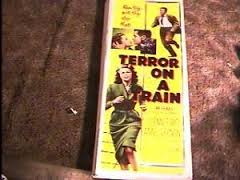
TERROR ON A TRAIN (TIME BOMB)
UK, 1952, 72 minutes, Black and white.
Glenn Ford, Anne Vernon, Maurice Denham, Harcourt Williams, Harold Warrender, Bill Fraser, John Horsley. Victor Maddern.
Directed by Ted Tetzlaff.
Terror on a train is an enjoyable and exciting small action adventure. Today it would be the material for an episode in a television series. However, made in the early '50s, it was an M.G.M. production, an English American co-production. Director Ted Tetzlaff had made some interesting films including the thriller The Window. Music is by John Addison and the photography by Freddie Young, both to have later successful and award winning careers. The setting is the British Midlands, the focus on a saboteur and a Canadian bomb disposal expert trying to find the bomb and defuse it. The screenplay has a second crisis which adds to the tension of the film. Glenn Ford is efficient in the central role, French actress Anne Vernon is the heroine. There is an excellent British supporting cast.
1. An entertaining thriller of the '50s? The perennial interest of this kind of crisis? Action adventure? Hero. villain, split-second crisis?
2. British production, American M.G.M. values? Black and white photography. location photography, musical score? Special effects? Editing and pace?
3. Conventional material, well presented? The hero and his dedication? The tension with his wife? Officials and their co-operation, demands? The saboteur? Familiar material but presented excitingly?
4. The plausibility of the plot? Post-war England? Trains, bombs. saboteurs, the police, the expert? The plausibility of the marriage background? A sense of realism with the locations?
5. Peter Lyncourt as hero? Glenn Ford's easy style? Canadian in England? His credentials. personality. marital background and the relationship with his wife, their scenes together? His expertise? Relationship with the British? The repetition of the plot with the second crisis and his coping?
6. The background of British officials, experts, the law, officialdom? The British character actors and their skill in creating characters briefly?
7. The heroine - the background of the marriage. her dilemma as regards leaving her husband, the crisis and its effect on her reaction?
8. The portrait of the saboteur - personality. skills. motivation?
9. The importance of tension and audience identification? The relief at the solving of the first crisis? The second race against time? A satisfying thriller?
Published in Movie Reviews
Published in
Movie Reviews
Tagged under
Saturday, 18 September 2021 19:23
Terrorists, The/ Ransom

THE TERRORISTS (RANSOM)
UK, 1974, 98 minutes, Colour.
Sean Connery, Ian Mc Shane, Norman Bristow, Robert Harris, Isabel Dean.
Directed by Casper Wrede.
The Terrorists is an underrated thriller, unfortunately lumped with the disaster epics because it focuses on a hi-jacking. However, the emphasis is not on the disaster, but on the terrorists, ruthless idealists, who create such situations. The film traces the efforts (and devious governmental deals and tricks) to capture the terrorists, a battle of wits among the hijacker, played with intensity by Ian Mc Shane, the terrorist leader waiting to be reused by the hijacked plane, and the head of security, played with convincingly gruff strength by Sean Connery. The settings are Scandinavian. A good thriller, generating step-by-step suspense on one special day at a modern airport.
1. The focus of the title? Original title was "Ransom". A better title? The terrorism behind the credits?
2. The interest in topical problems? How well used? For suspense, entertainment?
3. The importance of the Scandinavian atmosphere? The airport, winter, mountainous terrain? The contrast with Britain? The political atmosphere, the police and security methods?
4. The importance of the suspense in the plot, the twists, the detailed building up of suspense, the character clash, the threat to people's lives, the political and moral overtones?
5. The morality of the British holding a country to ransom? How well explored? Its plausibility and possibility? The decisions of government, police and security? The value of human lives?
6. The modern audience's attitude to terrorists and their holding the ambassador, to their hijacking the plane? Where did sympathies lie? How were these sympathies used for the momentum of the film?
7. Audience attitudes to politicians for example, Bernard?
8. Audience attitudes to the police, to the ordinary policeman, to the British, to Scandinavian security? How important for the audience to be on side?
9. The importance of Tahlvik? Sean Connery's performance? The explanation of his background for example.. the television programme, in the cafe, his attitude to surrender. his strengths. his ingenuity for example, in picking the spotter, the plane? His personality? His work with the police? That so much depended on his voice? His relationship to the terrorists?
10. How wise were his decisions? His obedience to orders? To his security chiefs, to the army. to the police, to the politicians, to the people on the plane? Did he make the right decision going on the plane in the end?
11. The enigma of Petrie? The impact of his hijacking the plane. the aspects of his personality revealed. his skill in handling the hijacking job. in rescuing Shepherd? In handling the people on the plane? Negotiating with Tahlvik? Audience response to his true identity? His right to hijack the plane? Relationship with Barnes? The retribution of his death?
12. The portrayal of Shepherd and the terrorists? Their ideology? Their escape? Their violence? Waiting with the ambassador? The encounter with the ambassador, the play of nerves? Shepherd and his dependence on Petrie? His death?
13. The portrayal of the pilots? Their landing the plane? Delaying tactics? Calm and handling of the situation?
14. The film's attention to detail to build up suspense and atmosphere: the courier on the plane, the pilot of the small plane and the scenic chase? His capture, the minor police. the prevention of Bernard entering for Tahlvik, his comment over the loudspeaker, the detail of the switch of vans?
15. Comment on the major issues of life and death. threats, decisions, playing games on an international scale? A modern drama in exploring modern situations?
Published in Movie Reviews
Published in
Movie Reviews
Tagged under